Hall of Home Learning Fame
Drum roll, please!
Here is the first ever Hall of Home Learning Fame MOVIE!
Keep sending in your (very fun to watch) entries – videos are ideal – and keep your eyes peeled for a special challenge from me and Mr Wain!
Thanks for working so hard, guys.
Enjoy!
28 April: Home learning
We hope you’ve had your breakfast and you are ready for today’s learning.
Here are your daily physical and mindfulness activities for you to try.
Physical activity: Today’s skills are based around cricket (although these skills could be also used in other games). Chance to Shine have now produced five skills based sessions to follow at home.
Mindfulness activity: Try a different activity from Mindfulness for Children Challenge. These activities can support our Living and Learning statement for this week, I recognise mental health is important.
Task 1 reading
Firstly, spend ten minutes on Lexia (if you can access this at home).
Today, we are looking at another image from Pobble365.

She turned in the saddle and looked behind her. Emma could see the others gaining on her.
Digging in her heels, she whispered some words of encouragement in the ostrich’s ears as it burst into full speed. They were making good time, but there was so far still to go…
1. Look closely at the picture and read the text. Then, answer the questions below.
2. What thoughts do you think are going through Emma’s mind?
3.Where do you think Emma is?
4.What do you think it would feel like to ride an ostrich?
5.How do you think the ostrich feels about being ridden?
6.What might be the title for this image?
Challenge: Imagine you can see through Emma’s eyes. What can she see behind her? Draw/describe what you have imagined.
Task 2 maths
Start your maths learning by joining in with this fractions based Super Movers song.
In our fractions learning today, we move onto learning about thirds.
White Rose Maths – Week 2 Lesson 1 Recognise a third
1. Watch the video and complete the activity sheet (on a printed copy or write the answers in your learning book).
2.Check and mark your answers – how did you do?
Challenge:
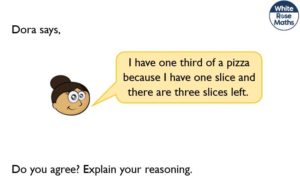
Task 3: science
Our new science topic is all about plants.
1.Watch the following video as an introduction to this learning.
2.Today you are going to be plant detectives. If you have a garden or when you have your daily walk, we want you to have a plant hunt. Look out for different plants and notice where they are. Remember trees are plants too.
3.Record some of your findings – you could even get some photos of the species you spot. Here’s an example plant identification guide to help you to name the plants you find.
Challenge: Can you name the plants we saw on our walk at the weekend?
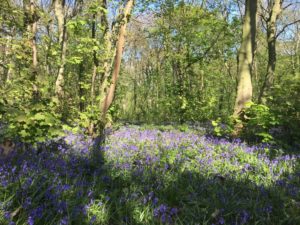
Finally, todays’ alternative activity, that you might want to try out at home, is touch typing. Keyboard skills are important to develop and Dance Mat Typing teaches this in a fun way.
21 April 2020: Home Learning
Hello there!
Hope that everything went well with yesterday’s learning.
Here are your tasks for today.
Writing
Lesson objective: To predict events in a story and infer what might happen next. 
The Bog Baby by Jeanne Willis
This is the text we are going to be reading.
Discuss the children’s first thoughts about what the story/ characters / setting could be.
Have you heard of a bog before? (Clarify what a
bog is using images and an online / dictionary definition)
What might a bog baby be? What does the front cover lead you to imagine will be inside the book?
What other characters could be involved in this story?
What makes you think this?
Share some ideas about potential plot, setting and characters.
Challenge children to explain the reasons for their ideas.
Listen to and read the first seven pages (2.12 minutes, up to the page where it describes the bog baby). https://www.youtube.com/watch?v=nVuH4BdVQOQ
What do you think will happen next?
What kind of character is the bog baby?
Therefore,what might it do?
What could happen if the children pick it up?
Make a list of the adjectives the author has used to describe the bog baby.
Now, use your prediction skills based on what you have read up to page 7.
Copy and complete these sentence stems using your predicting skills.
If the children pick up the bog baby ……………………………..
I think that …………………………………………..
The bog baby is …………………………………………….
Challenge 1
Draw a picture of the bog baby and add ten new adjectives to describe the creature.
Challenge 2
Put your adjectives into sentences like this one. Remember the comma if you are using more than one adjective in a list. We have done this in class before.
The blue creature has sharp, pointy toenails.
Task 2 Reading
LO: I can retrieve.
Read the text below and answer the fact finding questions.
All about cats
There are so many different breeds of cats from very long-haired cats to the hairless Sphinx cat. They were domesticated, or tamed, to be friendly with humans in Egypt more than 5,000 years ago! They are fun pets to have and will soon become a part of the family.
Persian cat – a very furry breed 
Cat Facts!
• Cats can run up to 30 miles per hour for short distances.
• Cats were considered sacred to the ancient people in China and Egypt.
• Cats do not have a rigid collarbone like many mammals. This is why they are able to squeeze through small spaces.
• Cats can see much better than people in low light.
How long do cats live?
Cats who live indoors are much safer than cats who are allowed to go outside as well. If a cat is well looked after and has regular check-ups then it can live to be 20 years or even older.
How do cats communicate?
Cats communicate in lots of different ways. They purr when they are feeling happy and content and hiss when they are feeling scared or threatened. Cats meow to tell us if they are hungry or want to go out and to communicate with other cats.
Questions
- How fast can a cat run?
- True or false? Cats that live indoors are safer than cats that go outside?
- True or false? A Sphynx cat has lots of fur?
- What might a cat do if it feels scared?
- A long time ago, who were cats were very special to?
Challenge Can you write two of your own fact finding questions? You can research more about cats if you like.
Task 3 Science
LO: Why is handwashing so important? 
The advice being by health authorities is to wash your hands with soap and warm water for at least 20 seconds, roughly the same amount of time it takes to sing “Happy Birthday” twice. In order to ensure that children understand how vital it is that they practise good hand hygiene, a simple, fascinating trick has been developed using soap, pepper and water.
Mrs Freeman tried the experiment at home.
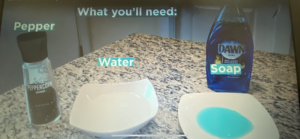
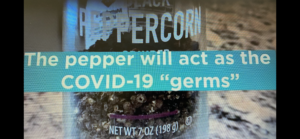
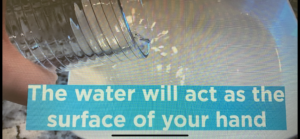
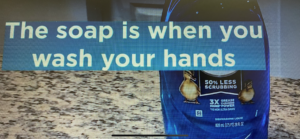
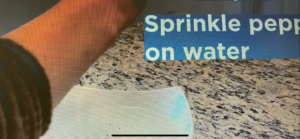
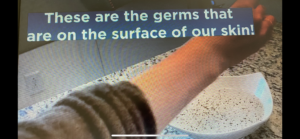
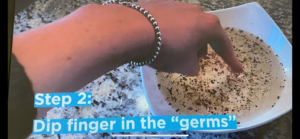
What do you think will happen? Explain why you think this?
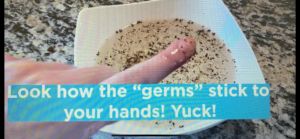
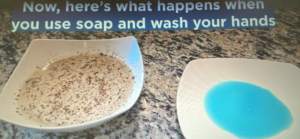
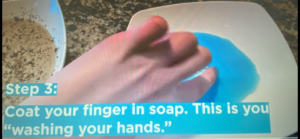
Mrs Freeman then puts her finger in a bowl of soap, before dipping it back into the bowl of pepper. Will the same thing happen with the pepper?
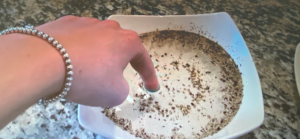
Explain what has happened.
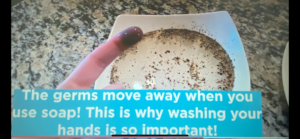
What happened?
The pepper rapidly moves away from the soap-covered finger.
Your turn
In your books write and draw pictures of this experiment in the correct order. You can number each step and make sure you label your pictures.
Answer these questions using full sentences.
- What was the pepper for?
- Did the soap make any difference? Explain your answer.
- Did you notice the pepper move? Why do you think this happened?
Challenge With the help of an adult, can you complete the experiment at home. If not, you can watch it here. Can you think of 3 questions you would like to know about the experiment? https://www.bbc.co.uk/cbeebies/watch/germs-experiment
Home learning (03 April 2020)
Yesterday’s post featured advice to support your child to stay safe online, and a second round of our Red Herring game. Today, we talk about home learning over the Easter period, and provide the answers to Red Herring.
Here’s a reminder of what’s happening for the next fortnight…
Today’s the last day of the Spring term so it’s the last day of the daily home learning tasks for now. We’ll still help you to support your child at home, but things will be a bit different:
- We’ll present a list of eight activities for your child (Years 1-6) – these will be published on the Homework pages at 9am on Monday 06 April.
- The list will be the same across year groups, meaning if you’ve more than one child, they might work on it together in some way.
- Some of the tasks can take a bit longer, like a mini-project.
- You can encourage your child to do some or all of the activities – they’re all optional.
- During this time, you can still email your child’s class teacher, although they may not respond as quickly as they have been doing.
Teachers will return to daily home learning tasks on Monday 20 April.
For children of key workers, and for children deemed vulnerable in some way, Scholes (Elmet) Primary and Moortown Primary remain open through the holiday, including on the bank holidays. (Thank you to all teachers who have agreed to work these days.)
If your child isn’t keen on one or two of the suggestions, or you want to supplement the activities with more, we’ve two great new resources that you can check out…
Get learning Maths on the move! These active learning resources which will help your child keep active while learning at home. There are ten activities for each phase: Y1,2 and Y3,4 and Y5,6.
Food – a Fact for Life (FFL) has lots of resources for teaching your child about where food comes from, cooking and healthy eating. There’s a lot to look at here, separated into different age ranges and different types of learning: healthy eating, cooking, where food comes from and food commodities. Each age range has loads of worksheets that you can download, too – we’d recommend talking through this with your child to come up with a sequence of learning activities. Check out FFL’s recipes, too!
We’ve added both of these to our home learning menu.
And now, the answers to Red Herring…
We asked you to identify the red herring statement about the admin team from Sphere Federation…
Mrs O’Malley, Sphere Resources Manager based at Moortown:
- I met my husband whilst learning to drive a tank. This is the red herring: Mrs O’Malley met her husband learning to sail.
- I have three British military qualifications: artillery survey, combat appreciation, and radio communications.
- As well as a yellow belt in kickboxing I also have a red belt in Ju Jitsu.
Miss Pallister, Admin Assistant at Scholes (Elmet):
- My first ever full-time job after leaving school was working for Education Leeds, in the finance department at Merrion House.
- Before moving to Scholes, I lived in Spain for five years.
- When I was younger I won various horse riding competitions. This is the red herring: Miss Pallister did own her own her own horse, though.
Mrs Quirk, Sphere Resources Manager based at Scholes (Elmet):
- Knitting is one of my hobbies – I love to make presents for friends and family. This is the red herring: Mrs Quirk did once make part of a knitted hoodie when her son was born, but her mum had to finish it off for her.
- In my teens, I was part of a group of people who raised money to buy medical supplies for a hospital in Malawi; I spent a summer over there when we took over all the supplies.
- One of my favourite jobs was as a Wedding Co-ordinator at a country house hotel – I loved planning and organising people’s special days!
Mrs Russell, Admin Assistant at Moortown:
- When I was younger, I fell off a horse and it trod on my leg – it didn’t put me off horse riding though! This is the red herring: it actually trod on Mrs Russell’s face, leaving a hoof print on her cheek for quite a while afterwards – ouch!
- I used to help mend shopping trollies.
- My favourite type of food is fish – anything apart from squid.
Mrs Walshaw, Admin Assistant at St James’:
- I can count to 10 in Japanese. This is the red herring: however, Mrs Walshaw can count to ten in Korean.
- When I was younger, my family owned two Shetland ponies but I never rode them.
- In my previous job as an air stewardess, I was part of a crew who took Manchester United football team to one of their European Cup games (now known as the UEFA Champions League).
30 March 2020: Home learning
Good morning, Year Three! How was your weekend? I spent mine in the garden getting lots of fresh air. It’s been great to see some of your home learning efforts at home. You’ve impressed me – well done!
Reading
Review
Check your comprehension answers from Friday against mine:
- (R) How does George react to the news?
She’s upset and angry because it says ‘It’s my castle!” she stormed to her mother’
- (R) How does Uncle Quentin react to George?
It says he was ‘surprised’ and ‘astonished’ at someone wanting to buy the Island for such a good price.
- (C) George didn’t use the best persuasive language to make Uncle Quentin change his mind! Present an argument to Uncle Quentin to persuade him to change his mind about selling the island. The challenge is: you can’t mention the map or the hidden ingots!
Write down a list of 4 reasons why the island shouldn’t be sold. e.g. Because it might harm the rabbits living there.
A:
- Because they might not look after the Island and the shipwreck won’t be around to be explored anymore.
- Because people travelling to the island will cause traffic in Kirrin Bay.
- Because the island was promised to George by her mother.
- Because George hasn’t got brothers or sisters to play with and Kirrin Island is one of the only places she can go and explore nearby.
- (R) True or false:
- Uncle Quentin gave the island to the men from London. F
- Uncle Quentin bought the island from the men from London. F
- The men from London bought the island for over a hundred pounds. F
- The men have man have shown they want to buy the island but haven’t bought it yet. T
- (R) What does ‘ingots’ mean? gold
- In the text, Aunt Fanny says: “George dear, I did mean you to have them to play on, when I thought they couldn’t possibly be worth anything,” said her mother, looking distressed. “But now things are different. Your father has been offered quite a good sum, far more than we ever thought of getting- and we really can’t afford to turn it down.”
Why does George’s mother look distressed?
A – because she realises she’s made a promise she can’t keep to George. She doesn’t want to break it because George is unhappy and angry but also doesn’t want to make uncle Quentin angry because he really wants to sell it for the money.
- Write a thought, as Aunt Fanny, showing what she’s thinking while saying this to George.
A – I don’t want to upset George but she’s only a child and doesn’t understand that we can make a lot of money from selling the island. It’s the right thing to do. I wish George wouldn’t be so disappointed.
- Which sentence best summarises chapter 10? Write the letter down.
- Uncle Quentin gets an amazing offer for Kirrin Island but the children aren’t sure about it.
- Uncle Quentin gets an amazing offer for the old box but the children don’t want him to sell it.
- Uncle Quentin gets an offer for Kirrin Island and the children are slightly worried their secret has been discovered.
- Uncle Quentin gets an offer for Kirrin Island and the children are incredibly worried their secret has been discovered.
Today’s learning
Watch the short animation ‘The Catch’ (click here). Then answer the following retrieval questions. Remember you can rewind the clip and make sure to double check your answers.
- Draw the boy from the video and label different aspects of this character’s appearance.
- Describe the setting the video is set in.
Spelling
Here’s a list of words to learn this week. These words either have the prefix ‘sub’ or ‘tele’. Check you understand what they mean. Start by practising them with your best handwriting.
submarine / telephone / substitute / telescopic / subconcious / telescope / subway / television
Maths
Today’s learning
Today’s learning is all about money. There’s a couple of challenges to do.
First, warm up by playing this ‘custom cars’ game here.

Times tables
This week, you’re to focus on your 8 times table. There will be a test on Friday.
Science
Today, you’re going to be identifying materiels and testing to see if they’re translucent, transparent or opaque. Either print this sheet out or set a table out in your book based on the one below. Remember to think about what the material is (wood / plastic / wo0l) not what the item is (tree / toy / jumper).

27 March 2020: Home learning
Happy Friday, everyone! Hope your week has been great and you’ve managed to enjoy the sunshine. Today’s tasks are maths, PE and writing.
Y6 Maths – LO: arithmetic
Your task today is to answer a mixture of calculations using the four operations that we’ve looked at this week.
First, though, I’d like you to hone your times tables skills using Times Tables Rockstars for at least 15 minutes.
- 9,256 x 23
- 2,856 ÷ 42
- 67.955 + 13.06
- 53 – 125
- 7,843 x 62
- 1,865 ÷ 17
- 128,356 + 50,844
- 623,952 – 256,482
Challenge
On Times Tables Rockstars, challenge someone to a battle!
Y5 & 6 PE
Let’s mix things up, today! I’m missing my fresh air/boogie/running for WUSU and I know lots of you will be as well. Today, you have two options:
Option A: Using your favourite song, create a WUSU style dance that lasts 2-3 minutes. It should take you about 30-40 minutes to choreograph and you could even post it (safely) to that website “TokTik” or whatever it’s called that you all love but I don’t get because I’m old…
Option B: Taking inspiration from people like Joe Wicks, I’d like you to make up your own fitness workout lasting 2-3 minutes. It could include press ups, star jumps, running on the spot, lunges, squats, sit ups, burpees – anything, really, as long as your audience doesn’t need any equipment so they can do it at home.
You could even get in touch with someone else from school and collaborate your efforts! As always, we would love to see how you’re getting on with your home learning so if you do video yours, we’d love to see on an email! You might go viral! Who knows??
Y5 & 6 Writing – LO: punctuate speech
Your task today is to write and punctuate speech correctly and write a dilemma for your character. This should be no longer than half a page. Following from your setting description yesterday, your character needs to run into some sort of problem. This problem must include dialogue between two characters.
R2s
- Punctuate speech correctly, using inverted commas and capital letters appropriately.
- Use the said clause in different places for speech.
- When there is a new speaker, start a new line.
Here is an example of a dilemma with dialogue.
The ship entered a dark and gloomy cave – the sea was calm and quiet. Without warning, a huge figure rose out from beneath the black water. “Prepare yourselves!” shouted Bjorn, as he unsheathed his sword.
“I am Odin,” bellowed the shadowy figure, “God of wisdom, god of magic, god of death.”
“Remove us from this cave and let us pass,” commanded Ragnar. He knew that Odin was a powerful god and would not take kindly to threats; he threw his sword onto the deck in a gesture of good will.
Odin grinned, “To leave this cave, the price of death must be paid. Sacrifice one of your men to me and I will guide you to the fame and fortune you desperately crave.”
“Do it,” hissed Floki, “Give him your son, Bjorn. You have many more sons and you will have many more!”
“You think the death of my son is worth the gold and glory?” questioned Ragnar, slowly, as he held his arm out to Floki.
“Yes,” spat Floki, clutching Ragnar’s arm. “Give him to Odin.”
Ragnar turned to look at Bjorn, then back at Floki. His eyes were full of rage. He grabbed Floki by his chest, and threw him overboard. “There is your sacrifice,” he growled.
Challenge
Correct the mistakes in the speech below. How many points will you get? There are 11 to spot!
“what are you doing Thor” cried Loki
A laughing Thor replied “what does it look like?
“Well, dancing, yes! said Loki, also laughing now but only you’re in your underwear!
26 March
***Yoga Space are running a free kids yoga this morning at 10.30am. You need to register 1 hour before the class starts to take part. ***
Thank you for all the photos of your home learning work so far. It’s been great to hear and see how you have been getting on and we are proud of all your enthusiasm. We are particularly impressed with how neat and well presented your learning is. Keep this up! It is important to take pride in your work. Have a look at the class news page to see some examples.
Physical activity: As well as your daily exercise outside your house, why not try one of the many activity videos on imovement. There are different ones each day.
Mindfulness activity: Today, take some time to lie down in a quiet place and listen to some relaxing music with your eyes closed. A chance to refocus before restarting your learning.
We’ve had another Lexia achievement with Penelope getting her next Lexia level yesterday. Well done! Where possible, the aim is to reach Level 9 by the end of Year 2.
Here are your home learning tasks for today.
Task 1 reading
Firstly, try to keep reading a variety of texts while you are learning at home. We recommend 20 minutes of reading every day.
1.Reread the fluency text all about polar bears. You should be able to read it a bit more fluently today now it is more familiar.
2.Use the text to answer the questions below.
Polar bears
Polar bears are the planet’s biggest land-based carnivores – although they actually spend most of their lives around water and ice (their Latin name means ‘sea bear’). So they’re at particular risk from global warming, which is melting the Arctic sea ice they depend on.
Polar bears generally live and hunt alone, though they can be quite social too. They mainly eat seals – using their remarkable sense of smell they can detect a seal in the water beneath a metre of compacted snow, and from almost a kilometre away.
Adults are strong swimmers – they can swim for several hours to get from one piece of ice to another. Their thick white coat and a layer of fat keep them warm and camouflaged in their harsh Arctic environment.
1. Are the following statements true or false?
Polar bears eat plants. TRUE or FALSE
Polar bears are good at swimming. TRUE or FALSE
Polar bears often eat seals. TRUE or FALSE
Polar bears can’t smell very well. TRUE or FALSE
2.Find and copy a word from the text that means
usually ___________
amazing __________
can’t be seen ________
firmly pressed together ___________
3.How do the polar bears keep warm in the cold Arctic environment?
Challenge: Can you think of your own question about the text?
Task 2 maths
Here are your answers from yesterday’s learning. How did you do?
1 curved side – circle
3 vertices – triangle
4 straight sides – rectangle
4 straight sides of equal length – square
5 sides – pentagon
6 vertices – hexagon
8 sides – octagon
For the challenge question, we would encourage the children to check the number of sides on a shape by marking each side with a line as they count.
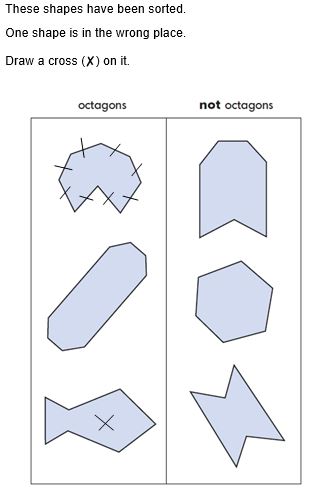
Before you start today’s activity, count in 2s, 5s and 10s (upto 24, 60 and 120). You could even teach someone how we use the cross crawl action when we count.
Today, we will be focusing on times tables. Remember in Year 2 we want you to try and learn your ten, five and two times tables (in that order).
1. Spend 10 minutes on Times Tables Rock Stars. Based on our checks in class, you have been set the times table that you need to practise. Please email (carolinetaylor@spherefederation.org) if you need help with logging in.
2.Complete the following number sentences. Remember to skip count on your fingers to help you.
3. Put the number sentences in order from from the lowest total to the highest total.
2 x 10 = __
6 x 5 = __
__ = 5 x 2
10 x 10 = __
0 x 5 = __
__ = 12 x 2
9 x 5 = __
1 x 2 = __
Challenge: Choose three of the above times table facts and write down the other facts you know using this information. For example, if you know that 4 x 10 = 40, you also know that 10 x 4 = 40, 40 ÷ 10 = 4 and 40 ÷ 4 = 10.
Task 3 Living and Learning
Our statement for this week is:
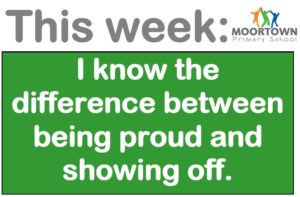
1. Tell someone what proud means.
2.Tell someone what showing off means.
2. Imagine someone has got first prize in a talent competition. Draw a picture of them (with two speech bubbles) telling a friend what has happened.
3. Use one speech bubble to show what they might say to their friend if they were feeling proud and in the other what they would say if they were showing off.
Challenge: What might you do if someone was showing off about something?
Finally, we’ve spotted lots of rainbows in windows as we’ve been out for our daily walk. Have you spotted any? Have you got one in your window? We’d love to see it!
25 March
Hope you are all set for today’s activities. You maybe starting to have some kind of routine or timetable now and as with the normal school day, remember to include plenty of brain breaks.
Physical activity: Joe Wicks’ live PE lesson is proving popular in our house – hope you are managing to join in too. It’s a great start to the day! Today, why not also try one of the many videos on GoNoodle. I know a particular class favourite is Banana, Banana, Meatball.
Mindfulness activity: Cosmic Kids Yoga have a variety of yoga, mindfulness and relaxation videos to follow online. Let us know which ones you’d recommend to a friend.
Well done to Leon who achieved his next Lexia level yesterday. Just 10/15 minutes a day can help your child to progress in their Lexia learning.
Here are your home learning tasks for today.
Task 1 reading
Reread the fluency text about polar bears from Monday. Today, read it aloud and take account of the punctuation in the text – a short pause for a comma and a longer pause where there is a full stop.
Hopefully you enjoyed the Pobble365 image from yesterday. There are no wrong answers for the questions that were set but it is always good if you can explain your answers by giving reasons based on the text/image. For example, maybe they had got the plane from a museum because it looks old.
Today, we have a poetry text including some of our spelling words this week.
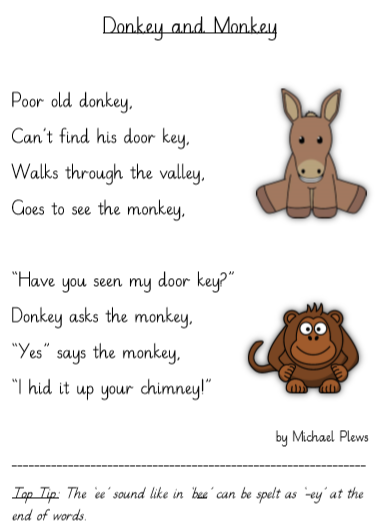
1.Read the poem aloud.
2.Read it again in a different voice. For example, an excited voice or a tired voice.
3.Copy out the words in the poem that follow the ey pattern like your spellings.
4.Think of other words that follow the ey pattern (Spellzone can provide some more if you get a bit stuck).
Challenge: Try and add a third verse following the pattern of the poem and including some ‘ey’ words.
Task 2 maths
Here are your answers from yesterday’s learning. How did you do?

Before you start today’s activity, write out, in digits and words, the numbers from 0 to 20.
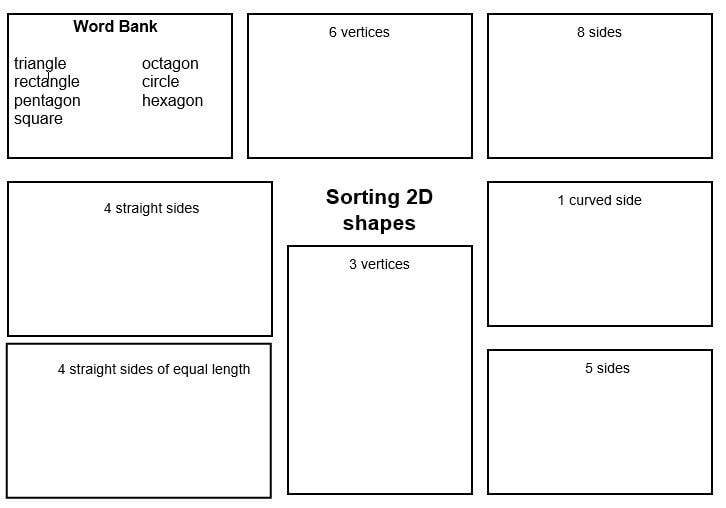
Today, we will finish our learning on 2D shapes with a sorting exercise.
1. Using the shapes listed in the word bank, sort them into the correct box.
2.Attempt to draw the shapes too.
Challenge: Complete the question below.

Task 3 Toys now and then
Imagine you have lost one of your toys (go and get it so you have it in front of you).
1.Write a description in sentences to help people find your toy.
2.Think about what adjectives you could include to give more description.
3. Include a picture of your toy too.
Challenge: Look at the adjectives you have used. Can you think of what is the opposite of these adjectives?
Finally, it would be great to see some of your home learning if you want to type it in an email (carolinetaylor@spherefederation.org and jackiefreeman@spherefederation.org) or send it as a photo. Keep working hard, everyone. You’re doing great!
24 March 2020: answers
Maths – LO: arithmetic
- 145 and 646
- 27 limousines are needed.
- 196 bundles with 4 left over.
- 4,263
- 691,247
- 16,539
- £1,140,697.25
- 650 divided by 12. She needs 54 boxes and there are 2 eggs left over.
- false, false, false
- 145,078
- 222,358
- 6 x 35 = 42 x 5
- difference = 4,950
Reading – LO: retrieval
- What did Odin want Freya to do? Command the weather and seasons.
- Why was it considered an important job? She had to get just the right amount of sun, snow, wind and rain.
- What was the name of Freya’s spouse? Odur
- What adjective was used to describe the cave/tunnel? dark
- True or false:
The sapphires in the cave were dazzling. false
The goblins’ skin was bumpy. true
The goblins gestured to the object on the floor. false - Find and copy a word which shows the goblins were stood together. huddled
- List two tools mentioned in the script. picks and shovels
- Match the adjective to the noun:
wet damp strange
noise air walls
damp – air
walls – wet
strange – noise - What garment is mentioned in the script? dress
- What event were Freya and her husband going to attend? a magnificent feast at Odin’s palace
- What was Freya’s intended destination when she left Asgard? Midgard
- List two ways from Loki’s speech that shows Freya did not want to kiss the goblins.
Freya was well shocked!
The thought of kissing those revolting faces!
Yuck!
she ran
24 March 2020: Home learning
Phonics
words to read:

words to write:
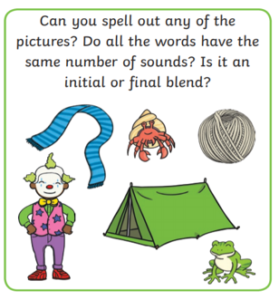
Phonics activity:
Write a sentence using one of the words you have written. For example:
The clown has a pink waistcoat
How did your child find the writing activity? Remember it’s OK for some words to be spelt phonetically. Encourage your child to write independently, rather than copy you.
Literacy
Choose a new book to read. Stop reading in the middle of the story. Can you guess what will happen at the end? Were you right?
What book did you read? What did your child predict? Let us know.
Maths: order numbers 0-10
Put the number cards from your pack in order. Can you find small objects to count to match. Count carefully!
What objects did your child use for the activity?
Extra activity
Did you make playdough? What did your child make?